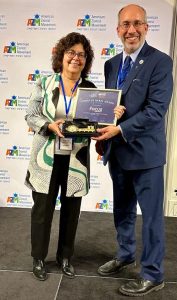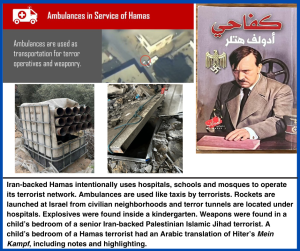This content is developed by The Focus Project in partnership with Mercaz USA. The Focus Project distributes weekly news and talking points on timely issues concerning Israel and the Jewish people, including antisemitism, anti-Zionism and the delegitimization of Israel. It represents a consensus view across a spectrum of major American Jewish organizations. Mercaz USA recognizes and respects the diversity of views on these issues among its readers and the community at large.


“In the end, we will remember not the words of our enemies, but the silence of our friends.” – Dr. Martin Luther King, Jr.
Great leaders condemn bigotry and make no excuses for hateful behavior. They lead by example and some voices of leadership are emerging above the clamor. Disturbing scenes of hatred in America against Jews and Israel have repeatedly crossed the line. While some protestors openly call for physical attacks against Jews and tear down posters of kidnapped Israeli babies, those who value human rights, morality and truth, are taking a stand. They call out hate on campuses, across social media, and the workplace – but they are also taking decisive action.
Many of America’s top law firms sent a letter to the deans of several law schools – including Columbia, Stanford and Yale – condemning the “antisemitic harassment, vandalism and assaults on college campuses, including rallies calling for the death of Jews and the elimination of the State of Israel.” They are concerned that law students are not receiving a proper education in their curriculum and ethics. These firms recruit from universities and are committed to a zero tolerance policy for discrimination. Some have rescinded job offers to graduating students who express hate and bigotry.
“I’d rather put you in a gas chamber,” is one of several violent messages sent by an attorney in the Illinois comptroller’s office to a Jewish person on Instagram. She continued: “Bet you’d like that, with all your Zionist ancestors, Hitler should have eradicated all of you.” The lawyer was fired. Hate and discrimination in the workplace should never be acceptable anywhere.
University alumni and donors also are translating words into action, proving that their support is not unconditional. A University of Pennsylvania graduate who has donated millions of dollars to his alma mater sent a $1 check, his new annual gift amount until “the board of trustees grows the backbone to fulfill its mission, which is to govern the university according to the principles upon which it was founded.”
Some university presidents have also spoken out. University of Florida President and former U.S. Sen. Ben Sasse was one of the first to issue a forceful statement: “I will not tiptoe around this simple fact: What Hamas did is evil and there is no defense for terrorism. This shouldn’t be hard. I also want to be clear about this: We will protect our Jewish students from violence. If anti-Israel protests come, we will absolutely be ready to act if anyone dares to escalate beyond peaceful protest.”
A member of the University of California system’s governing body slammed a letter from the UC Ethnic Studies Council, condemning it for “willingly choosing to be surrogates and supporters for Hamas’ destructive actions. It is beyond shocking that you rely on falsehoods, inaccuracies and antisemitic innuendos.” Following a freeze in donations by more than 1,600 alumni, the Harvard president “reiterated what I and other leaders have already said: there is no place for antisemitism at Harvard.”
In late October, the ADL and Louis D. Brandeis Center for Human Rights Under Law sent a letter to nearly 200 college and university presidents in response to the dramatic increase in anti-Jewish incidents on campus. The organizations called on the presidents to urgently investigate Students for Justice in Palestine chapters for “potential violations of the prohibition against materially supporting a foreign terrorist organization.”
Columbia University temporarily suspended its campus chapters of the virulently anti-Israel SJP and Jewish Voice for Peace. Both groups support the destruction of the Jewish state – an antisemitic mission. The groups were suspended because they violated campus event policy. At the anti-Israel event, a person shouted racist and anti-Jewish statements. Days earlier, Brandeis University banned its SJP chapter for openly supporting the Hamas terrorist organization.
Universities are not the only cesspools of hate against Jews. A Michigan hospital fired a medical director for celebrating the 10/7 attacks as a “beautiful day.” A NY physician’s assistant praised the Hamas terrorists and stated that the “Zionist settlers got a taste of their own medicine.” A CA radiologist tweeted: “Zionists are genocidal, demonic, greedy, pedophilic retards.” Some were affiliated with university hospitals, such as NYU and Emory. A FL dentist was caught ripping down posters of the kidnapped victims. They all lost their jobs.
Similar behaviors also extend into Europe, where a Norwegian ICU nurse was let go after posting a picture of himself posing at work while showing off his Hamas tattoo. A British doctor commented in German that “the Jews are our misfortune,” referred to Jews as “circumcised venom” and called a Facebook user a “Jew boy.”
There are many videos on social media showing Americans ripping up posters of the hostages held by Hamas. In a recent example, a University of Southern California PhD student was captured on video giggling while defending her actions in response to the false accusation of ‘genocide.’ The physics teaching assistant is the daughter of a Washington mayor. In an interview with Piers Morgan, a young CA man repeatedly smiled while defending his actions. He stated: “The posters are perpetuating the narrative that Hamas are terrorists,” and that “the attack wasn’t on Jewish people.”
Hamas is believed to be holding about 240 hostages from more than 30 countries. An exact count is difficult to determine because Israel has been unable to identify the remains of more than 200 bodies burnt beyond recognition during the Hamas massacre – including DNA. Archaeologists trained to analyze ancient artifacts are helping to identify human remains left from the carnage. Hamas terrorists will not allow the Red Cross or other humanitarian aid organizations access to the hostages.
Recently, dozens of Broadway performers, including Debra Messing, recorded a song, “Bring Them Home: A Broadway Prayer.” The video recording includes the names and ages of all of the hostages scrolling along the bottom of the screen in an attempt to bring attention to their plight and pray for their safe release.

American Zionist Movement Executive Director Herbert Block presents The Focus Project with its annual Vision of Herzl Award

1. Businesses have an obligation to take action against hate mongers
Businesses – including law firms, universities and hospitals – have a moral duty to act when employees and students promote hate of any kind including anti-Jewish beliefs or actions. More than just advancing an inclusive workplace, they have a responsibility to protect, patients, customers and fellow employees from harmful behavior. How should Jewish cancer patients feel if they are being treated by a doctor that jokes about prescribing the wrong medications? Standing up to hate should be unequivocal, and sympathizing with Palestinian civilians and advocating for their freedom from Hamas should not be a contradiction.
2. Talk must translate into meaningful action
The effectiveness of leaders’ words is demonstrated by the behavior and actions they take. A press statement condemning anti-Jewish hatred is welcome, but concrete steps must be taken to protect American Jews. Leaders must be measured by the alignment of their words with meaningful, substantive actions. In the face of rising antisemitism, leaders bear the serious responsibility to not only vocalize solidarity but to actively contribute to the safety and well-being of the Jewish community.
3. Leaders must be applauded for their actions
Promote and praise leaders who take decisive action against anti-Jewish hate, incitement and violence. Effective managers, college deans and corporate executives recognize concrete measures are required to ensure the safety and well-being of all communities. Whether firing bigoted employees, suspending student groups that violate campus policies, counteracting prejudice or advocating for legislative changes, leaders who take tangible steps deserve commendation.
You might hear: Israel intentionally targets hospitals, schools and mosques.
Reality: Hamas purposefully uses precious civilian areas, including hospitals, schools and mosques, to store weapons and use as military outposts. Hamas even uses ambulances as taxis for its terrorists! Explosives were found in a kindergarten. Children’s rooms in the homes of terrorists contained weapons and one had a highlighted copy of Hitler’s Mein Kampf.


A. Use your voice: spread the messages in these talking points
Take action by using your voice to spread the crucial messages outlined in these talking points. Share them in your social circles to highlight the importance of unity against anti-Jewish hatred of American Jews and Israelis. Use everyday conversations, social media and community forums to amplify these messages. Your voice can be a powerful catalyst for positive change.
B. Attend a rally in support of Israelis
There have been mass protests against Israel across America and the world – an estimated 500,000 marched across the London Bridge recently. Gatherings in support of Israelis have been much smaller except in France, where an estimated 180,000 marched against antisemitism. There are only about 15 million Jews globally – and half live in Israel. Non-Jews are regularly seen at the anti-Israel demonstrations but far less show up to support Israel. Whether Jewish or non-Jewish, Democrat or Republican, please help demonstrate your support for Israelis now. Watch the March for Israel in Washington, DC: https://www.marchforisrael.org/live/
C. Pray for the safety of the hostages
All religions can unite in support by taking spiritual actions. Many pastors and priests are recommending that parishioners ‘adopt’ a hostage and pray for their release. Chabad – an ultra-Orthodox Jewish group – launched a website promoting other ways to spiritually show support. Chabad’s spiritual brigade allows users to make pledges, including reciting a psalm, studying the Torah and giving to charity.
***** ***** ***** *****
“Anyone would rather be dead than kidnapped, especially if you’re a woman; so I prayed to die quickly.” – Written by Laura, a married 35-year-old Israeli hi-tech worker, producer of nature festivals and seven-year army veteran, living near Tel Aviv with her husband Shay.
We arrived at the area on Thursday, brought our camper van, and thought, this is so much fun. It’s a long weekend, a long festival, three days long. We woke up on Saturday at around 5 am, had coffee together, and were about to go to the dance area. I had just finished tying my shoelaces when I opened the door to the camper, and saw everyone looking up at the sky.
At that moment, the music stopped. They said there’s a Red Alert rocket siren and we have to leave the festival and lie down on the ground. When the rockets started falling, we ran outside. There’s no shelter, only open space, and you only have a 15-second warning to find cover.
After about 30 seconds, we started hearing bursts of gunfire and RPGs, explosions, machine guns, “Allahu Akbar.” Screaming, screaming, so much screaming. For about 10 minutes, we just lay there, and I thought I understood what I was hearing, but I really didn’t.
At 9:30, it became a bit quieter, and we realized that the shots we were hearing were confirmations of killing.
At 10:30, for the first time, a terrorist tried to pry open the door to our camper. He tried two, three times. Shay and I looked at each other. At that exact moment, they found someone alive outside. Someone who had run and escaped, so the terrorists ran after him. I heard them yell multiple times, “come here” in Arabic and then they shot him.
At 11:00, we started hearing more and more terrorists coming to the area. They were on ATVs, shooting into the air, honking, yelling “Allahu Akbar,” and we realized that they were taking over the area. Then they shot at the camper. Two bullets. One passed right over Shay’s head, the other hit the air conditioner.
Then one of them looked in through a window and saw us. That was the moment I realized it was over. I sent my contacts a message that we’d been found, that it was a matter of minutes. To tell my parents and siblings that I love them.
Shay looked at me and said he loves me, and I said I love him, and we said goodbye with our eyes. I thought it was the last time I’d ever see him and he’d ever see me. We parted with a glance, and then I closed my eyes.
And then I thought that when you’re dead, it doesn’t hurt you. It hurts everyone else. So I thought about my parents, and I thought about my siblings, and how would they manage without me. And then I was scared, I was scared that Shay would die and I would survive. I knew I didn’t want to get out of this without him. And then I prayed to die quickly. I prayed that they wouldn’t kidnap us.
There’s a saying in the army, better a dead soldier than a kidnapped one. And I know why that saying exists. Anyone would rather be dead than kidnapped, especially if she’s a woman. So I prayed to die quickly.
I told myself that if that son of a bitch terrorist has a rifle, then I hope he at least knows how to shoot. Let him finish me with one bullet, and not make me bleed out for eight hours. They kept banging on the camper, but they couldn’t break it, and they couldn’t take it, so they tried burning it. They spilled something on it and we smelled something burning.
Finally, we started hearing retaliation fire. Yagil, the owner of the security company at the festival, and a friend, sent a location that we should meet him at. We were scared to open the door.
We went outside, our hands in the air. Imagine. Bodies everywhere. Bodies everywhere. Bodies. Everywhere. The phrase “bodies everywhere” doesn’t begin to describe it. Massacre. A battlefield. Images you don’t even see in movies, even in the worst horror movies. Only, maybe, in images from the Holocaust do you see amounts of bodies like that. And all of the bodies had blue wristbands on their wrists. Blue wristbands, from the festival. And we walked, and there was a couple there, and a pile of bodies there.
Later, we tried to find out how to leave the area. When we drove by, we saw that beside nearly every car, there was a body. Bodies all along the road.
We made it to a village. We met friends, and I was so happy to see that they were alive. And then the rocket sirens started, and we all ran to the safe room. We wanted to go home, Shay really wanted to get out of there. And we were about to leave, but they said there were terrorists in our city, too. We couldn’t leave, we had to hide.
Eventually, we made it home. Only when I opened the door to my house did I let myself cry and break down. When the numbers started climbing on the TV screen, we knew, because we’d seen it. We had seen the bodies. We had seen the massacre. We had seen it all.
Time had passed quickly and unbearably slowly at the same time. On the one hand, we were there for six hours, which is an eternity. On the other hand, something was always happening. Even when it was quiet, there were still gunshots. We didn’t know when the IDF would take control of the area. We thought Hamas had taken over. We just heard more and more of them, more terrorists and more vehicles, and they were breaking everything, and looting everything.
We thought it had been a mistake to come to hide in the camper. We didn’t know that everybody who had been outside earlier had been shot, or had run to the fields and was shot there. Only a few survived. At that moment, I had felt so guilty for telling my friends to come with me to the camper. There was a lot of fear, a lot of guilt. Mostly, I was scared for everyone else, and angry at myself.
I wasn’t scared to die. I had accepted it. I had said, fine, just let it happen quickly. I don’t want to bleed for hours, I don’t want to be in pain, I don’t want to be kidnapped. I wanted to die quickly. My only prayer was to die quickly.
Excerpted from Laura’s full story, among many from 10/7 massacre survivors.
***** ***** ***** *****
***** ***** ***** *****
